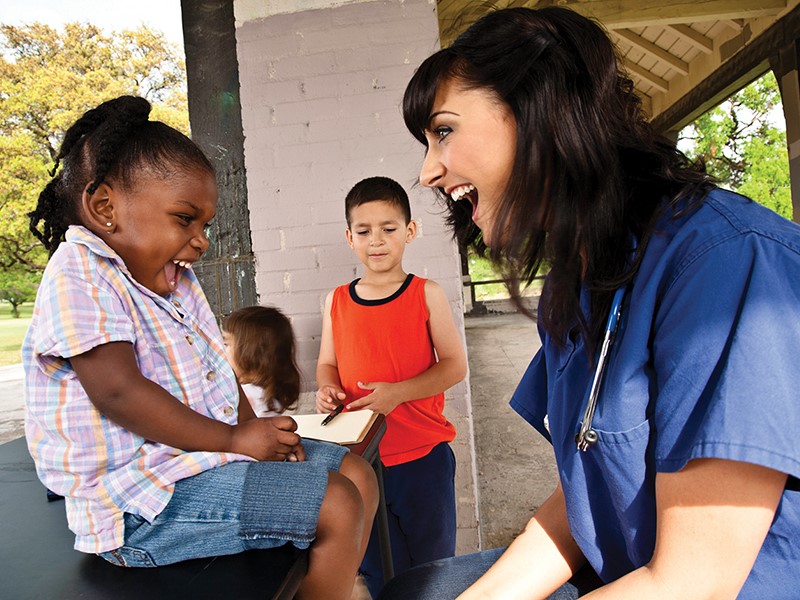Bridging treatment in Alaska
How an Anchorage hospital is transforming care for patients with substance-use disorder
Amidst the nation’s staggering opioid crisis, nurses like Kelly Ogden, who manages nursing staff at Providence Alaska Medical Center’s medical unit, face the growing challenge of caring for patients who are struggling with substance misuse and withdrawal.
They come to Ogden’s Anchorage hospital for medical conditions such as skin infections, abscesses, and infections of the heart and bones caused by injecting drugs. Patients with substance-use disorder also have a high incidence of HIV and hepatitis C. Some are injured in accidents while under the influence of substances.
Until recently, Ogden said, conflict often flared at the Anchorage hospital between clinical staff and patients with substance use disorders. “We weren’t treating the patients for their substance-use disorders, so when they had withdrawal symptoms or uncontrolled pain, they were medicating themselves and going outside and using,” she said. Many patients left too soon, against medical advice, because they felt stigmatized or marginalized. Their risk of overdose and ongoing drug use after discharge was high.
Others, said Ogden, were reluctant to come to the hospital at all because they feared being stigmatized by the clinical staff. Patients put off treatment until their medical illnesses had gotten much worse and more difficult to treat.
The medical center also opened a bridge clinic that provides MAT to recently discharged patients. In these efforts, the center is supported by Well Being Trust and the Clinical Performance Group, which aims to better integrate mental health and substance use treatment into the nation’s health care system, as well as by Providence St. Joseph Health and the State of Alaska.
“In the past, we primarily treated substance use disorders in specialty behavioral health settings,” said Renee Rafferty, regional director of behavioral health for Providence Health and Services Alaska and co-leader of the Clinical Performance Group’s Addiction Focus Group. “With these pilots, we’re changing that.”
A better way
Under the clinical pathway, health clinicians at Providence Alaska Medical Center are trained to see opioid use disorder as a neurological condition that should be treated as soon as possible, Rafferty said. They assess whether patients in their inpatient units have opioid use disorder, and where they are on a withdrawal scale. If the patient needs it, they can prescribe drugs such as methadone and buprenorphine, which help ease symptoms of withdrawal so that clinicians can treat their medical problems.
At the same time, clinical staff focus on building positive relationships with patients, Rafferty said. “Making patients feel safe is part of exceptional care. Patients can’t engage in care unless they feel they can safely talk about what’s happening to them.”
That means making sure staff don’t view substance use disorders as a “moralistic or hedonistic failing” and that clinicians have the tools to adequately support patients in withdrawal, she said. It also means working closely with hospital security and the police to ensure staff are safe.
“When there’s illegal or criminal behaviors, such as violent escalations or dealing drugs on our campus, we want to make sure we’re partnering with security —but it’s grounded in our mission of reducing harm to patients,” she said.
‘Huge win’
Once patients leave the hospital, it’s critical they have support to continue on the path toward better health. So the hospital’s new bridge treatment center offers recently discharged patients a range of outpatient services. These include MAT, peer support, individual intervention with a therapist, a prescribing clinician, brief intervention, and stabilization so patients can transition to a substance use treatment center if necessary.
“Without specific and integrated connections between physical treatment and mental health care, it is incredibly hard to solve the deeply rooted issues dealing with poor health and well-being,” said Robin Henderson, PsyD, Chief Executive, Behavioral Health, Providence Oregon and Clinical Liaison to Well Being Trust. “The bridge treatment center is a great test case that can provide a proof point for the future of integrated care.”
In just a month, Ogden has seen four patients from her unit go on to the bridge clinic or other community treatment options. “To get someone treated for substance use after they leave the hospital is a huge win,” she said.
Though the clinical pathway and bridge clinic are still new and their full impact is yet to be seen, clinicians and system leaders have high hopes the approach could work across health care and systems.
“The outcomes will prove that integrated, whole-person treatment improves health and drives down cost,” said Philip K. Capp, MD, Medical Director of Providence Health Plans, in Seattle. “All that aside, it is the mission of Providence to serve the vulnerable. We will not leave anyone behind.”








